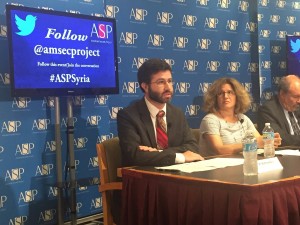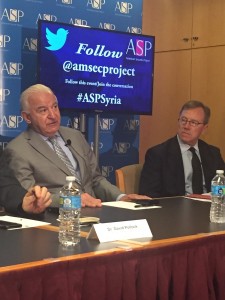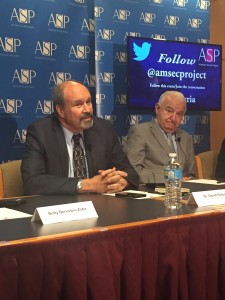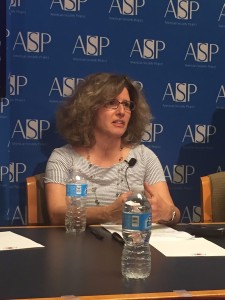
Event Recap: “Strategy for Stabilization and Reconstruction for Syria”
Podcast: Play in new window | Download
Subscribe: Apple Podcasts | RSS
On June 21, American Security Project hosted a panel discussion, marking the launch of its latest White Paper, “Strategy for Stabilization and Reconstruction in Syria.” Moderated by Brigadier General Stephen Cheney, the panel featured the following speakers: Matthew Wallin, Betty Bernstein-Babza, Dr. David Pollock, and Hani Masri.
Matthew Wallin, resident fellow of the American Security Project, opened the event, summarizing the White Paper. While recognizing the operational success of the U.S. military, he noted the lack of an endgame strategy in Syria. The growing population of Syrian refugees stand testimony to this failure. With an estimated 4.5 million displaced, the necessity for effective and efficient long-term planning, rather than short-term fixes, is imperative.
“Less is more,” stated Wallin, stressing that the quality of and type of strategy is key. First, realizing the importance of local stabilization, Wallin suggested grassroots campaigns as well as the proper enactment of funds for individual cities. However, efforts cannot be limited to this alone. The inclusion of partners and allies will help ensure the success of Syrian reconstruction as well as counterterrorism efforts. The plan must overall strengthen the relationship between the state and the Syrian people. Syrian hands must rebuild Syria, creating both value and physical infrastructure within the country. Time and strategic patience will help determine this strategy’s success.
Hani Masri, Chairman of Capital Investment Management Inc., agreed that U.S. action is imperative for stabilization. Masri noted the uniqueness of the Syrian population, pointing out the multiple cultural groups, such as the Sunnis and Alawites. Then, in order to seek stabilization, there must be unity. “There should never be a full winner,” Masri determined, pointing out the complicated relationships among these multiple parties, and the uncertainty of future reign. Rather, a stable coalition among all groups would prove most effective. While political stabilization has an immediate benefit, stabilization would also enable the future Syrian population.
Dr. David Pollock, Kaufman Fellow at The Washington Institute for Near East Policy, called for immediate action. Dr. Pollock started with a personal anecdote of a visit to Syria in 2012. Moved even then by the extremity of the refugee crisis, Dr. Pollock noted that now the situation is likely to worsen, despite the current limited ceasefire. However, urgent humanitarian and reconstruction programs are imperative. Pollock pointed to existing pockets of safe areas within Syrian cities as starting points. Given that Russia and Iran seemed determined to transform the Syrian crisis into a military victory, Dr. Pollock pointed to the need for other partners, including the Kurds as a solution. Indeed, while controversial, and likely to upset Turkish relations, Dr. Pollock insisted that reconstruction and stabilization must begin somewhere, somehow. He concluded: “We need to act now.”
Betty Bernstein-Zabza is the Senior Policy Advisor at the Office of Global Women’s Issues at the U.S. State Department. Prefacing her discussion with a quick overview of the office’s mission, Zabza looked to stabilization efforts made in Iraq as an example of how similar work could be done in Syria. Working with the counter-ISIL group in Iraq and through a focus on liberated areas, the office has furthered the recognition of women as key players and the consideration of women’s issues.
Asked by Brigadier General Cheney about the need for U.S. leadership in Syrian stabilization, the panel deliberated opinions on the magnitude of American involvement. Masri determined that a solution was only possible through U.S. help; whereas Dr.Pollock thought of the situation as a humanitarian opportunity, which necessitated no U.S. troops on the ground. Wallin noted that recent attempts in Iraq, Afghanistan and Libya differed in scope of involvement, and none succeeded as hoped. Instead, a focused objective that is long-term, rather than short-term is needed. Citing Iraq, Bernstein-Zabza indicated the necessity to include the perspective of women, especially in future planning committees. Masri agreed that the inclusion of women was necessary, looking to personal experience of when women had led successful efforts to educate and enable youth in the Palestinian territories.
The event closed with a Q&A section. The discussion maintained that humanitarian need was necessary, and that reconstruction was possible.










